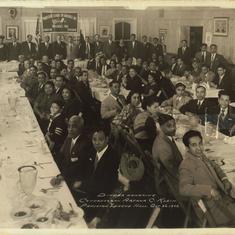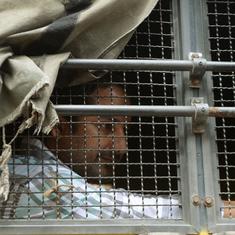Late on Sunday night, a crowd quickly coalesced near the administrative block at New Delhi's Jawaharlal Nehru University as news spread that at least five students charged with sedition had returned to the campus. These students, including Umar Khalid, had not been seen in public since the Delhi Police on February 12 arrested JNU Students' Union president Kanhaiya Kumar on charges of criminal conspiracy and sedition for allegedly shouting "anti-national" slogans at an event about Kashmir.
Kumar's arrest – and the seeming lack of proof against him – united the students and teachers, prompting thousands to participate in protests against his detention, both on campus and in the heart of New Delhi.
Now, the broad-based consensus against the police intrusion into the campus and the campaign to have Kumar freed appears to be facing a crucial moment, as the focus shifts from the JNUSU president to Umar Khalid and other former members of the Democratic Students Union who allegedly organised the contentious event.
The Delhi Police seem to be struggling to find evidence of sedition against Kumar, and Home Ministry leaks have even suggested that the case against him was an "over-reaction". Instead, the authorities have turned their focus to Khalid, who has been painted by news organisations over the past few days as both a far-Left radical as well as an Islamist.
Some participants in the campaign to demand Kumar’s release are concerned about whether students and teachers as well as leaders of the various political outfits in JNU will back Khalid as enthusiastically as they did the JNUSU president.
In some ways, the events of Sunday evening – where the JNU administration and teachers decided not to again allow the police on campus while the rest of those accused in the case surfaced – were an attempt to pre-empt any loss of momentum in the campaign.
Fear of a slowdown
On Tuesday, the Delhi High Court will consider an application for Kumar to be granted bail, which seems likely to be permitted since the Delhi Police said it would not oppose the plea.
But a section of students at JNU say that the mass media's portrayal of Khalid as an Islamic fundamentalist and the videos being played on loop, which allegedly show him demanding “azaadi” for Kashmiris, may alienate some supporters. Khalid returned to JNU on Sunday, after being untraceable for a few days and made a speech to a large crowd.
Divya Garg, a non-partisan supporter of the protests and a student of literature at JNU, fears the contours of the protest will change once Kumar is released.
“[After Kanhaiya Kumar’s release] the movement is going to lose momentum,” Garg told Scroll.in. “Classes will start. People will go back to not caring. Some parties and students might stick it out but it will be half-hearted, especially considering the unity with which it has been going, but that’s going to fizzle out once he’s cleared of charges.”
Like many other students who spoke to Scroll.in, Garg, too, believes that Khalid may be “tough to defend”. These students believe that the slogans he alleged shouted in support of Afzal Guru, who was executed for his role in the 2001 Parliament attacks, will not sit well with the general public.
“To stand with him is to stand with the slogans and the fact that nothing is wrong with having a pro-Afzal event on campus,” Garg said, adding that many outside the campus will not understand the importance of the right to free speech that he exercised. “I wish Umar had never gone on TV. He had too much faith in people being sensible.”
Since he came into the spotlight last week, Umar Khalid’s sisters and family have claimed that they have been receiving daily threats from unknown people. His sister, Maryam Fatima, who is doing a PhD at a university in the US, told NDTV that even though she didn’t agree with the anti-India slogans, there could have been some foul-play involved.
“The issue of sloganeering is shrouded in a lot of fabrications and lies," Fatima said. "Several of the videos were doctored. It is ridiculous to ask us if we think it [anti-India slogans] is okay. Of course not. But you have to dig deeper and see who was raising them. He is a true son of India.”
Khalid is not the only person the students are concerned about. Even the staunchest supporters of the campaign are worried about the level of support that will be extended to the other students named in the Delhi Police's First Information Report – including former Democratic Students Union members such as Anirban Bhattacharya – as the case develops.
Graded support?
These fears are also being expressed by JNU supporters on other campuses. Baljeet Kaur, a student at Tata Institute of Social Sciences in Mumbai, pointed this out in a post on a site called India Resists:
“It was their [Umar Khalid and others'] way of showing anger against the oppression they have been suffering. It was perhaps more out of passion and rage. But that also is a result of their complex circumstances which have (if not all but largely) been caused by the Indian state. So, student bodies and other organisations condemning or distancing themselves from these ‘anti-national’ slogans is very dangerous.”
This was also echoed by Dyuti Sudipta, a gender studies student at TISS. “Very few people are going to stand by Umar and that’s because of his stand on the Kashmir issue,” she said. “He is very unapologetic about his pro-azadi stand and hence the force will be not as much as in Kanhaiya’s case. People agree with Umar but they are scared to show that they do.”
Qualified solidarity
Many on the JNU campus who have so far supported Khalid do not agree with his slogans. These conditionalities had led the JNUSU to express “qualified solidarity” to him in its statements after an investigation was ordered into the Kashmir event on February 9, at which “anti-India” slogans were allegedly shouted.
Avipsha Das, an M.Phil student, who has led agitations like Occupy UGC for the reinstatement of fellowships as well as Pinjra Tod, which aims to end discriminatory hostel rules for women in universities, believes that there’s a danger of the agitation slowing down when it comes to defending Umar and others who may have actually raised slogans.
“Firstly, we all are very scared given the current atmosphere,” Das said. “Right now, we are all just shouting and proving our nationality and patriotism. I don’t deny we have political differences with the kind of politics Umar and his friends practice in DSU, but that is the beauty of it. However, the space for dissent is so severely curbed now, one has to think a hundred times before voicing anything.”
Others insist that nothing will change. “Right now we are standing for the whole university and our right to dissent, not just for Kanhaiya,” Shehla Rashid, the JNUSU vice president, told Scroll.in before Khalid had resurfaced. “We have given calls to intensify the movement after our president is released because no student will be allowed to be demonised as a terrorist or anti-national. The media coverage and news cycle might impact how much attention the issue receives in the future but our mobilisation will not stop until everyone’s cleared of charges.”
Later on Sunday evening, after Khalid had returned, Rashid reiterated this support, saying they would stand up for all the students accused of sedition because they knew that they were innocent.
Meanwhile, organisers of the agitation are talking about forming a committee to raise awareness about the other students accused in the case, including Khalid.
“There’s a real fear that the administration will revoke Kanhaiya’s suspension but not of others, to divide the students. But we can’t let that happen,” a JNUSU member said on condition of anonymity. “Whatever has happened has happened, and now our job is to support Umar even if some people choose to drop out of the movement because of their disagreements.”










